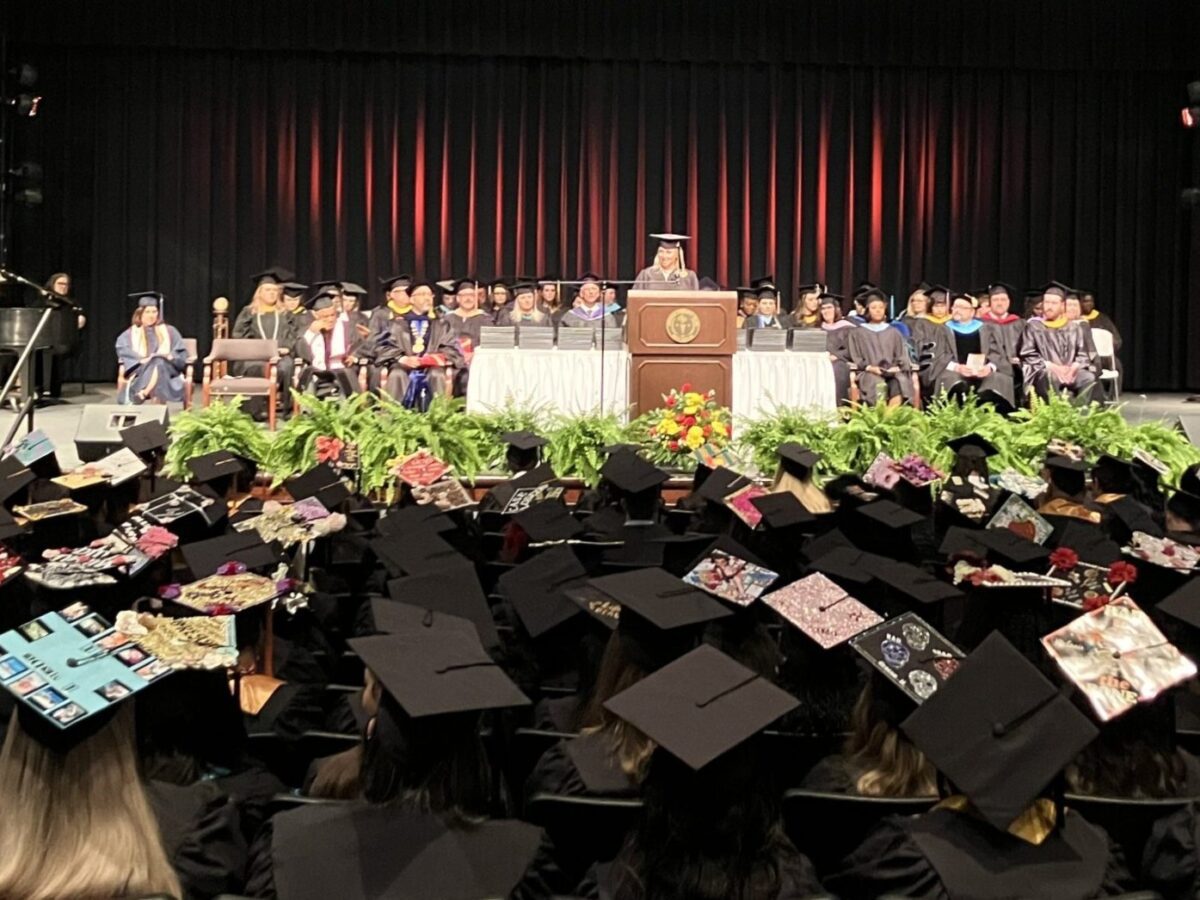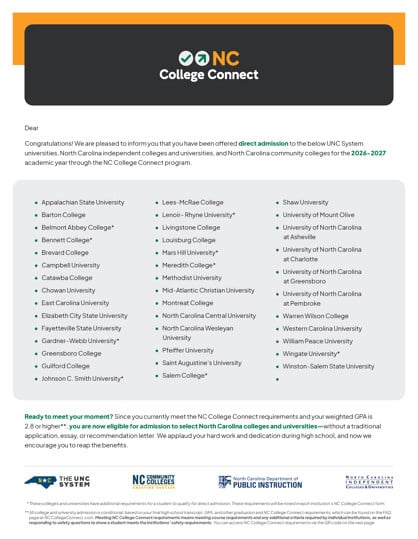
More than 62,000 North Carolina public high school seniors are set to receive direct admission to select colleges and universities across the state this fall thanks to the NC College Connect program, according to a press release from the UNC System Office.
During the State Board of Education’s meeting last week, the Department of Public Instruction’s (DPI) Sneha Shah-Coltrane said specifically 62,959 students were directly admitted to at least 34 participating colleges last week.
“We are changing the trajectory of North Carolina. We are changing their lives,” Shah-Coltrane said on Wednesday.
![]() Sign up for the EdDaily to start each weekday with the top education news.
Sign up for the EdDaily to start each weekday with the top education news.
Through the program, students who completed their junior year at a North Carolina district or charter public school with a weighted GPA of 2.8 or above, and who meet the NC College Connect requirements, are automatically admitted to select North Carolina colleges and universities — without having to complete a traditional application.
“This is a defining moment for North Carolina education,” said Mo Green, state Superintendent of Public Instruction. “When our entire education community works together like this, students win. NC College Connect removes barriers and creates clear pathways to college for thousands of our students.”
NC College Connect requires that students complete specific coursework, respond to institutional safety questions, and fulfill any additional criteria set by individual colleges.
These institutions include 11 UNC System universities, 29 independent colleges and universities, and the state’s 58 community colleges.
“NC College Connect is making it easier than ever for students to take that first step toward a college education,” said Jeff Cox, president of the North Carolina Community College System (NCCCS). “By removing barriers and simplifying the process, we’re helping more students access the life-changing opportunities our community colleges provide — close to home and at a price they can afford.”
Eligible students began receiving admission letters through the College for North Carolina (CFNC) portal last week, informing them of their admission for the 2026-27 academic year. Students should also receive notification by mail starting the week of Aug. 18.
After accessing NCCollegeConnect.org, students can see the list of institutions to which they have been admitted. At that point, students can complete a brief form to accept their admission. Then, they will be on track to enroll at the college or university of their choice.
“There’s no catch,” Shah-Coltrane said.
What is NC College Connect?
NC College Connect is a program that grants direct admission to select participating colleges and universities for North Carolina public high school students with a weighted GPA of 2.8 or higher, provided they meet the program’s requirements. Eligible students will see a customized list of institutions in their CFNC portal based on their GPA.
The program is a partnership between the University of North Carolina System, North Carolina DPI, GEAR Up North Carolina, the NCCCS, North Carolina Independent Colleges and Universities (NCICU), the North Carolina State Education Assistance Authority, and the Office of the Governor.
“We are delighted to be a part of this joint initiative, bringing the unique strengths and characteristics of our independent colleges and universities — with locations across the state, small class sizes, specialized programs, and personalized attention — into this streamlined pathway for students,” said Hope Williams, president of the NCICU.
What are ‘direct admissions’?
In most cases, eligible students won’t have to go through the traditional application process to enroll at these select colleges or universities — no essays, no recommendation letters, no laundry list of extracurriculars, and no Common App. Once each student decides which admission to accept, they can choose to enroll in that college or university.
“NC College Connect represents a fundamental shift in how we approach college admissions in North Carolina,” said Peter Hans, president of the UNC System. “We started this initiative with a simple question: how can we make the path to college clearer for students who are ready to succeed? By eliminating unnecessary complexity, we’re ensuring that college-ready students can focus on choosing the right institution for their goals, not navigating bureaucratic hurdles.”
Which institutions are participating?
Participating UNC System institutions:
- Appalachian State University
- East Carolina University
- Elizabeth City State University
- Fayetteville State University
- North Carolina Central University
- University of North Carolina Asheville
- University of North Carolina at Charlotte
- University of North Carolina at Greensboro
- University of North Carolina at Pembroke
- Western Carolina University
- Winston-Salem State University
Admitted students who enroll in Elizabeth City State University, Fayetteville State University, University of North Carolina at Pembroke, and Western Carolina University will only pay $500 per semester in tuition as part of the low-cost NC Promise plan, the UNC System release says.
Participating NCICU schools:
- Barton College
- Belmont Abbey College*
- Bennett College*
- Brevard College
- Campbell University
- Catawba College
- Chowan University
- Gardner-Webb University*
- Greensboro College
- Guilford College*
- Johnson C. Smith University*
- Lees-McRae College
- Lenoir-Rhyne University*
- Livingstone College
- Louisburg College
- Mars Hill University*
- Meredith College*
- Methodist University
- Mid-Atlantic Christian University
- Montreat College
- North Carolina Wesleyan University
- Pfeiffer University
- Saint Augustine’s University
- Salem College*
- Shaw University
- University of Mount Olive
- Warren Wilson College
- William Peace University
- Wingate University*
*These colleges and universities have additional requirements for a student to qualify for direct admission. These requirements will be noted in each institution’s NC College Connect form.
North Carolina’s 58 community colleges
According to the UNC System release, students will automatically be directed to the traditional application process for their local community college, where they have received direct admission.
Will students be admitted to all the institutions participating in NC College Connect?
Students will be matched to a select list of these institutions based on their weighted GPA and meeting individual institutions’ requirements. That’s why this week some students were admitted to as many as 41 institutions, according to DPI, whereas most received offers from at least 34.
Students must maintain their admitted GPA throughout their senior year. An institution can rescind their admission offer or require additional information, like test scores, if the student’s GPA drops below their admitted GPA.
What are the NC College Connect course requirements?
The program has basic course requirements — though some independent colleges and universities have additional requirements for direct admission, such as foreign language courses.
According to the NC College Connect website, students meet the program’s course requirements if they have met the state graduation requirements, including a fourth-level math class.
How do students accept their admissions offer?
Students can scan the QR code on their letter to visit NCCollegeConnect.org. There, they will see a “Claim Your Spot” green button, where they can login to the NC College Connect portal using their CFNC.org login credentials. In the portal, they’ll see the list of institutions offering them admission.

“Students can accept admission at as many institutions as they’d like, just as any other student might apply the traditional way and be accepted to multiple institutions,” according to the website.
Students will have to submit a short form for each school where they would like to accept their admission. This step does not enroll a student; it only informs the school of the student’s interest in accepting their admission offer. Students will receive additional information from their schools of choice with next steps for enrollments and more information on financial aid.
If the student is interested in enrolling at their local community college, the program will redirect them to the college’s traditional application. Students must fill out the application but will be automatically admitted. The portal only has the capacity for students to be admitted to one community college even though all 58 are participating. Students are encouraged to apply to as many other community colleges in the state that interest them.
“There is no need for a student to submit a traditional application through Common App, CFNC.org, or the institution website for the institutions where they have accepted admission through the NC College Connect portal,” according to the program’s website.
What’s on the form?
Students will be asked to provide their name, date of birth, email address, intended major, and intended start term (fall 2026 or spring 2027). They will also receive some basic questions about campus safety and military affiliation.
What is the deadline for students to accept their offer?
Each institution in the program has its own application deadline, ranging from Jan. 15 to July 15, 2026. Many community colleges have flexible or rolling deadlines. Students should confirm their school of choice’s deadline in the portal and accept their offer before that date.
Are there fees for the schools students choose?
Most forms submitted through the portal will be free. Some institutions require application fees ranging from $20 to $75 alongside the forms, according to the program’s website.
Community college applications are always free. Fees to participating independent colleges and universities submitted through the program’s portal will be waived.
The program encourages students to submit their forms during College Application Week, Oct. 20-26, to avoid application fees at other participating colleges. Students can confirm the list of schools waiving fees that week on CFNC.org.
What about the cost to attend college?
As long as students select for their transcript to be sent to the colleges and universities of their choosing, they will be considered for scholarship opportunities, according to the website.
- Students are encouraged to visit CFNC.org to explore additional avenues to pay for college, including completing the FAFSA to determine what federal, state and college-based financial aid they qualify for.
- Some students may be eligible for The Next NC Scholarship, a program that helps most North Carolinians from households making $80,000 or less pursue higher education by fully covering tuition and fees at any community college or more than half, if not all, of tuition and fees to attend any public university in the state. Students can complete the FAFSA to apply.
- Some students may be eligible for The NC Need-Based Scholarship, a state financial aid program for North Carolina residents attending the state’s independent, nonprofit colleges and universities. Students will be considered automatically for this scholarship upon completion of the FAFSA.
— CFNC website
- Students should also discuss their options with the financial aid office at the college or university of their choice to inform their college decisions.
Will students have to complete their Residency Determination (RDS) when they accept their admission?
“A student will not have to indicate or complete Residency Determination (RDS) when they submit their short NC College Connect forms,” says the website. “However, establishing in-state residency is an important step in the college-going process to help students save money on college expenses and should be completed at a later date.”
Additional resources
NC College Connect is hosting a webinar for students and parents on Sept. 16 at 6 p.m. Office hours will be held to answer questions on Aug. 26 from 6-7 p.m. and Sept. 30, 6-7 p.m.
Resources in Spanish about the program are available here. The full NC College Connect website is available in Spanish by clicking Español at the bottom of the site.
School counselors and educators can access additional information about the program here. These resources are also available in Spanish for download here.
Webinars for school counselors will be held on Aug. 20 at 1 p.m.; Sept. 3 at 10 a.m., and Oct. 7 at 1 p.m.
You can view more resources on CFNC’s website.
Recommended reading



